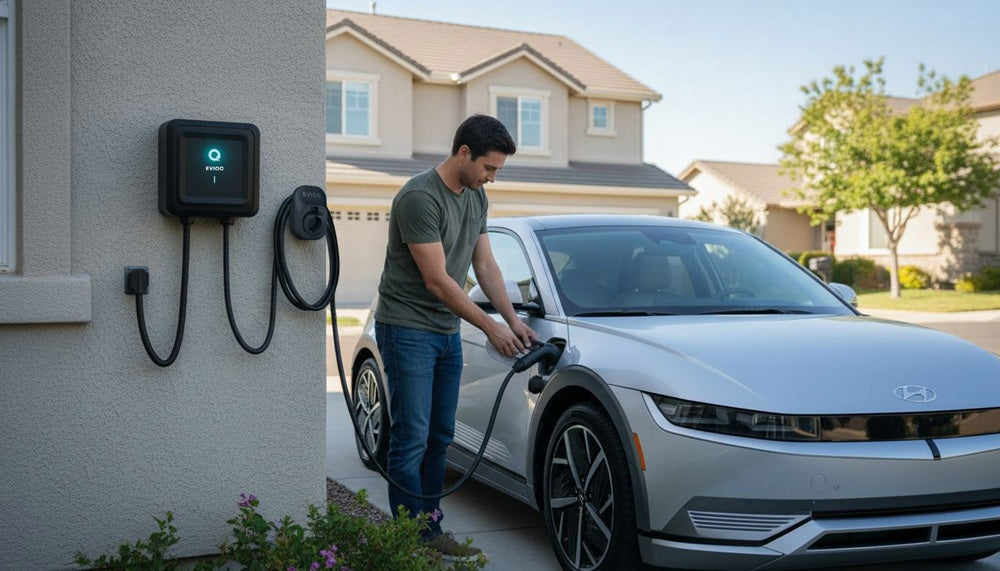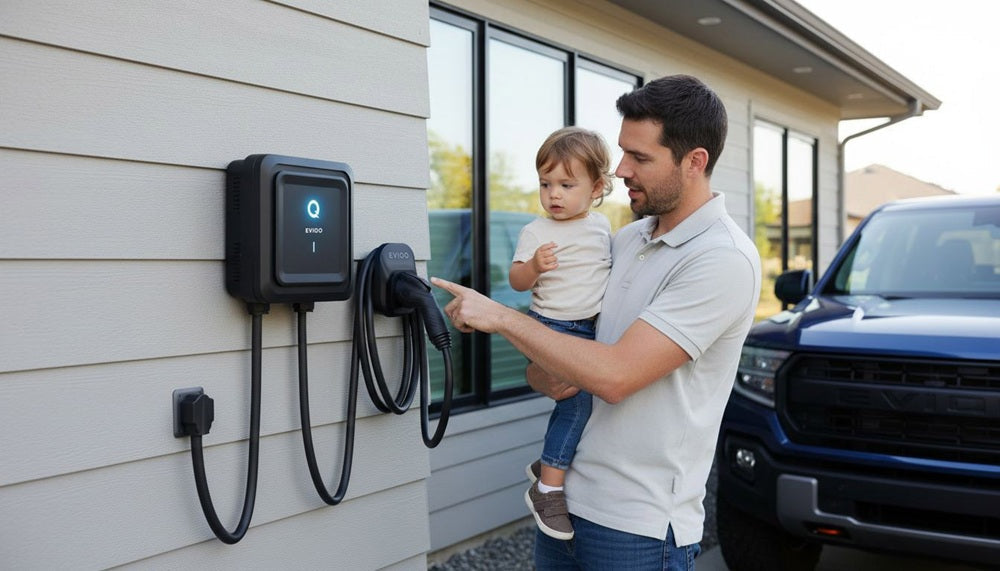EVs are getting more popular, and every car brand offers at least one electric model. Hyundai didn’t stay out of the game and released several electric cars. Its IONIQ 5, IONIQ 6, and Kona Electric are really popular. The sales of IONIQ 5 have grown by 90% in 2025.
Why do so many drivers prefer electric cars? First, you don’t spend the same money as you would spend on gas. Second, home charging is way more convenient. You do it overnight in your garage and don’t waste time at busy stations. Most Hyundai models come with a basic charger. But you can always get a more powerful one and speed up charging time. The only challenge is to select the right charger. Why challenge? Because the market offers plenty of options, and many drivers don’t know which one to buy.
What is the best EV charger for Hyundai? Let’s review top EV chargers for home use, discuss their features, and share installation tips.
Get to Know Hyundai’s EVs
Hyundai's EV lineup has several models. All electric cars they produce have the J1772 plug for charging. But new models also have the NACS port and a free adapter.
- 2025 IONIQ 5. It’s a stylish electric SUV with 303 miles of range. It charges very fast with its 800V system and has battery options from 58 to 84 kWh. You can find it in standard and sporty N versions. A great model for families.
- 2025 IONIQ 6. This sleek sedan offers up to 361 miles of range. It supports 800V charging. If you drive every day, this model is an excellent choice.
- 2025 Kona Electric. It’s a compact SUV with up to 261 miles of range. It has the CCS/J1772 port but also includes adapters for NACS. The battery is 64.8 kWh. This EV is perfect for urban driving.
- 2025 IONIQ 5 N. It’s a more powerful version of the IONIQ 5. The model has 641 horsepower and an 84 kWh battery. It charges very quickly and is often chosen by customers.
- 2026 IONIQ 9. It’s an upcoming three-row SUV with a promised 300+ miles of range. The model is designed for larger families. A special benefit is super-fast charging – the battery reaches 80% in less than half an hour.
An EV Charger for Hyundai – Things to Know

You can buy it online in just a few clicks. But here are several factors to consider if you want stress-free charging.
Charging level and speed. Level 1 chargers are very slow and are good only if you drive very little. Level 2 chargers work better. For example, you need a whole day or more to charge a car with a Level 1 charger, and less than 10 hours if you use Level 2.
Amperage and power output. A 16-amp charger provides about 3.8 kW, a 40-amp charger delivers 9.6 kW, and a 50-amp charger reaches 12 kW. But you must check your EV’s technical details.
Connecter type and cable length. All Hyundai EVs use the common J1772 connector, so most home chargers will work. Cable length matters too. A longer cable (18–25 feet) makes parking easier.
Smart features. Many EV chargers can connect to Wi-Fi or Bluetooth. You can schedule the charging via a remote control or connect your charger to smart home systems.
Weather resistance. For outdoor use, pick chargers with an IP66 rating or similar. It means they’re protected against dust and heavy rain.
Safety. Always buy a charger with safety certificates to be sure it meets strict electrical safety standards.
Home Chargers for Hyundai EVs - Top Picks

Here are six top chargers you can purchase for your Hyundai based on expert tests and user feedback.
1. ChargePoint Home Flex
Hyundai recommends this model for home use through their Hyundai Home marketplace. It’s a Level 2 charger with smart features. It's fast, compact and app-integrated for better control. It can plug into a 240V outlet or be hardwired for more power. Hyundai’s Home program helps connect you with local installers.
Features
- Adjustable power output from 16 to 50 amps
- Compatible with 240V circuits
- Wi-Fi and smart charging features
- Cable management system
- Good for outdoor use
This EV charger for Hyundai is officially recommended by the carmaker - it has a sleek design and advanced features. However, it’s more expensive than basic modes and requires professional installation.
Home Flex is Hyundai's partner charger, and the reviews prove this model is reliable and user-friendly.
2. EVIQO Level 2 EV Charger 40 Amp
This EVIQO model gives fast 40-amp/11.5 kW charging at a more affordable price. It’s a great choice for Hyundai EV owners who want speed without spending too much. It is in the mid-range market segment and therefore is chosen by many EV owners.
Features
- 40-amp capacity (11.5 kW)
- NEMA 14-50 plug for 240V
- Energy Star certificate
- Compatible with J1772
- Compact size (9.45" x 9.45" x 4")
The model performs very well. But note that you need a dedicated 240V circuit for it. Another nuance is fixed amperage, which is not suitable for premium models.
The installation is simple. The compact size and design also help with wall mounting. Users appreciate its strong performance and safety.
3. Autel Home Level 2 EV Charger
This model is a powerful choice for home use. It offers 50-amp – maximum Level 2 charging for Hyundai EVs. Its durable design and flexible installation make it easy to use at home. The indoor/outdoor rating provides flexibility in mounting location. The Autel charger is positioned at the higher end of the market.
Features
- 50-amp capacity
- 240V operation
- 25-foot cable length
- Hardwired design
- Indoor/outdoor durability
High capacity allows EV owners to charge their cars at record speed, but it requires professional hardwired installation. Also, it may be too much for smaller EVs or low daily mileage needs.
Users who travel a lot and those who own multiple EVs rate this charger highly for its robust construction and speed.
4. SEGUMA Level 1/2 EV Charger
You can use this charger for both types of outlets: standard 120V or 240V. If you often have to switch between Level 1 and Level 2 charging, this is a model you may need. It’s also portable. Any homeowner will cope with the installation. Plus, it’s an affordable option in the EV charger market.
Features
- Dual-voltage operation (110V-240V)
- 16-amp maximum current
- 25-foot cable
- Includes NEMA 6-20 plug and NEMA 5-15 adapter
- Portable design
The model offers unparalleled voltage flexibility and is easily portable. However, its 16-amp maximum limits charging speed compared to more advanced models. This EV home charger for Hyundai is not the option for those who drive a lot.
Users purchase this charger as an everyday option and as a travel companion.
5. Tesla Universal Wall Connector
The Tesla Universal Wall Connector is a strong solution with a built-in Magic Dock that works with both Tesla (NACS) and Hyundai (J1772) EVs. It’s a premium choice for households with multiple EV brands or if you are going to shift to the NACS standard.
Features
- 48-amp capacity (11.5 kW)
- Integrated NACS & J1772 connectors
- Wi-Fi connectivity for smart features
- Power-sharing with other Tesla units
- 24-foot cable
This model is highly rated for its durability and universal compatibility. But note that it requires a professional hardwired installation and is a premium-priced unit.
The installation is more complex as it is hardwired only, so you will need a qualified electrician. Users say it performs week even in extreme weather and also like the ability to charge any EV without a separate adapter.
6. Emporia EV Charger
The Emporia EV Charger offers powerful 48-amp charging and advanced smart features at a very competitive price. It’s a top value EV charger for Hyundai owners who want premium capabilities without a premium cost.
Features
- 48-amp capacity (11.5 kW) hardwired / 40-amp plug-in
- NEMA 4 rated for indoor/outdoor use
- Wi-Fi and app monitoring
- Dynamic load balancing
- 25-foot flexible cable
This model is certified and performs exceptionally well. But note that it currently uses only a J1772 connector.
Both hardwired and NEMA 14-50 plug-in options are available for installation. Users appreciate its excellent performance, affordability and the excellent customer support from the company.
| Model | Max power | Connector | Smart features | Price | Best for |
| ChargePoint Home Flex | 16-50A (adjustable) | J1772 | Yes | Premium | Tech-savvy users who want premium features |
| EVIQO Level 2 | 40A | J1772 | Yes | Mid-range | Budget-conscious owners |
| Autel Home Level 2 | 50A | J1772 | Varies by model | Premium | High-mileage drivers and multi-EV households |
| SEGUMA Level 1/2 | 16A | J1772 | No | Budget | Renters, travelers, and those who need flexibility |
| Tesla Universal | 48A | J1772 and NACS | Yes | Premium | Households with multiple EV brands. |
| Emporia EV Charger | 48A | J1772 | Advanced | Mid-range | The value-seeker who wants smart features without the high cost. |
Installation Tips and Requirements

Choose the right circuit. Level 2 chargers need a 240V circuit. Older homes may need panel upgrades to handle the extra load safely.
Hire a qualified electrician. A professional knows local codes and may help you qualify for rebates. Hyundai Home can connect you with trusted local installers.
Pick a smart location. Consider parking habits, cable length, and weather exposure. Keep cables safe and don’t create tripping hazards.
Check for incentives. Always check what rebates are available for the EV charger for Hyundai.
Typical Charging Speeds of Hyundai EVs
Hyundai’s electric models can charge at speeds up to 10.9 kW, so you need a good Level 2 home charger (40–50 amps).
- IONIQ 5 (77.4 kWh). A full charge takes about 7–8 hours.
- IONIQ 6 (77.4 kWh). Similar speed - you need 7–8 hours to fully charge.
- Kona Electric (64.8 kWh). Slightly quicker, taking around 6–7 hours for a full charge.
In everyday use, charging efficiency is about 90–95%. However, it may be lower if you charge outdoors. If you charge your EV during off-peak hours, you can even reduce the costs by 20–30%.
Conclusion
So, which EV home charger for Hyundai fits your needs? For Hyundai EV owners, the ChargePoint Home Flex is great if you want to use Hyundai’s official offers. The Tesla Universal Charger is perfect for homes with both Tesla and non-Tesla cars. If you are on a budget, consider Emporia or EVIQO – these models give you solid performance and smart features at a lower price. The best charger for your Hyundai EV is one that fits your daily routine, charges fast enough for your needs, and matches your budget, including installation costs.



Leave a comment
This site is protected by hCaptcha and the hCaptcha Privacy Policy and Terms of Service apply.